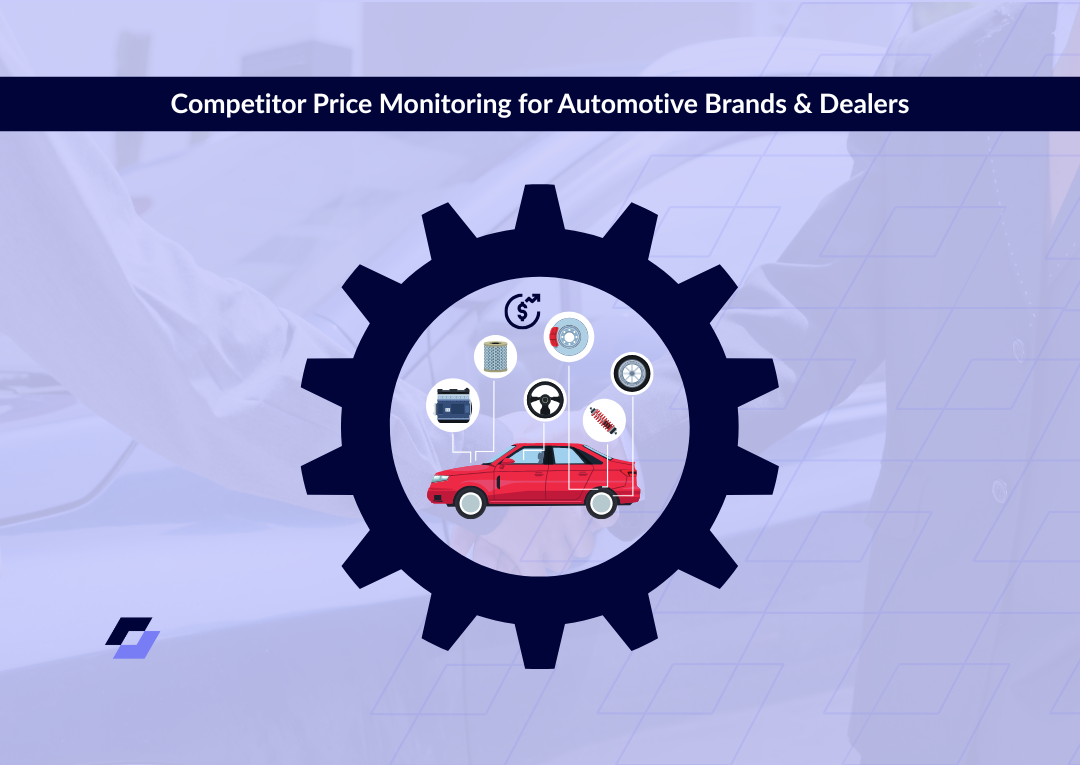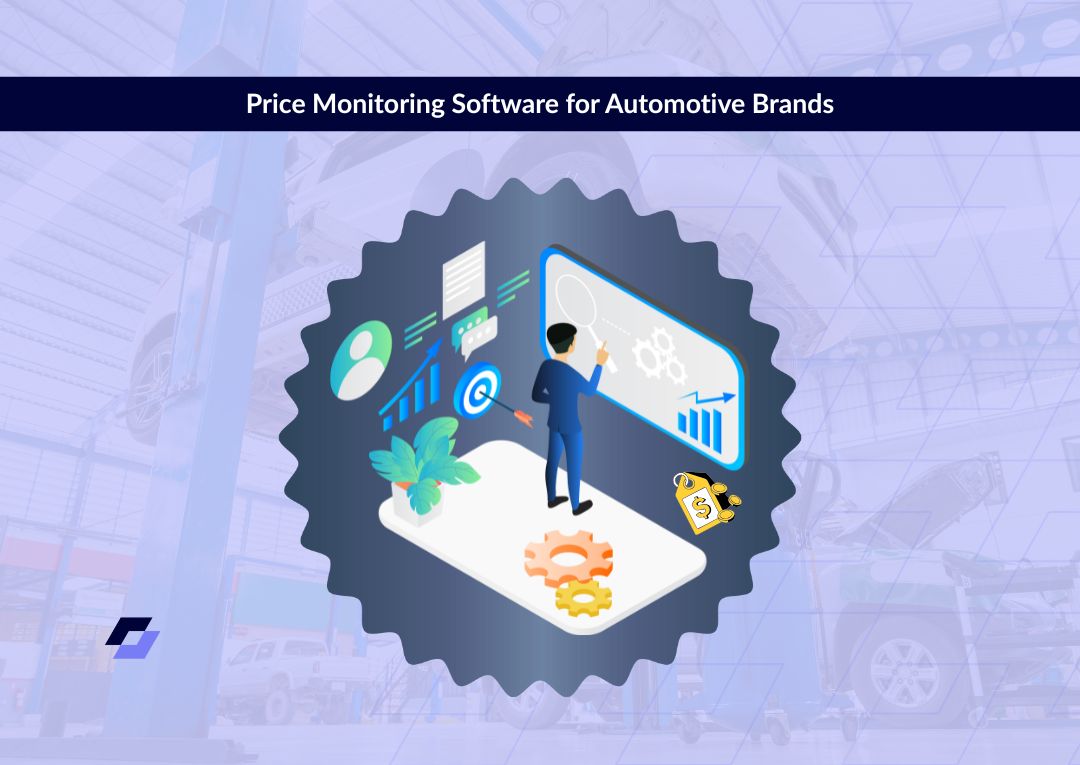© 2025 PriceIntelGuru. All Rights Reserved
Have you ever had to deal with frustrated customers looking for auto parts that just don’t seem to match their requirements or that of their vehicle? It’s very common. Can you believe studies show that as much as 30% of auto parts are returned for this very reason that they do not match well?
Imagine your automotive business ending up receiving more returns than payments from customers looking for matching Auto parts. Terrible, isn’t it? But how do you avoid this common scenario in the automotive e-commerce market? The answer is reducing errors significantly by using AI! AI-driven product matching is a machine-learning approach for product matching and categorization that can supercharge your accuracy in matching products as well as customer satisfaction.
Research shows that businesses that are using AI product matching solutions and real-time data can bring down these returns by 20% and increase profit by 10%. Want to be amongst these forward-thinking businesses yourself and reap benefits like better accuracy, increased customer satisfaction rates, and fuss-free dealings? Read along and get the hang of how AI-driven product matching in e-commerce is making a good difference.
First Up, What is AI-Driven Product Matching?
Simply put, AI-driven product matching is about using advanced algorithms to identify and suggest correct auto parts based on different parameters like vehicle specs, customer needs and preferences, and real-time inventory data. This technology basically analyzes large amounts of data to make sure that your customers receive the most fitting and accurate product recommendations when it comes to finding auto parts.
In an industry where vehicles require numerous parts, ensuring your customers find the right match quickly is crucial to staying competitive. After all, product matching helps streamline their shopping experience by reducing the time spent searching for compatible components. To make it clearer, here’s how product-matching AI algorithms function to make it happen:
- Machine Learning: AI algorithms use product-matching machine learning techniques to analyze historical data and work with greater accuracy over time as they learn from previous matches and customer dealings. For example, if your customer frequently buys brake pads for a particular make and model, the system you select will learn this preference and suggest to your client similar products in the future or repeat search instances.
- Real-Time Data Integration: One more thing AI Product matching tools use is real-time data and that too from various sources like customer feedback, supplier data, and manufacturer specification to constantly keep the product catalogs updated. This ensures that your customers always see the most relevant options available.
Challenges in Auto Parts Product Matching
Auto parts product matching comes with unique challenges which explain the need for using cutting-edge solutions:
- Data Inconsistency: Variability in part numbers and descriptions across different manufacturers complicates accurate matching. For example, one manufacturer may label an auto part differently than another, leading to confusion.
- Complexity of Vehicle Specifications: With thousands of makes and models on the road today, ensuring compatibility can be challenging without robust data analysis. A single vehicle might require different parts based on its production year or specific features.
- High Return Rates: Incorrect matches lead to increased return rates, which can significantly impact profitability and customer trust.
How AI Enhances Product Matching Accuracy – What’s the Process Like?
Doesn’t matter if you are an experienced businessman or dealer from the auto parts industry or someone who is just dipping toes in the competitive market, one thing everyone knows in the industry is that accuracy in product matching is imperative for success. Wondering how AI can boost product-matching accuracy for you and your clients or what’s the process like generally? Here’s a breakdown:
1. Data Collection
The very first step in AI product matching is all about collecting data. AI systems collect information from different sources namely competitor pricing, reviews of customers, and manufacturers’ databases. This detailed approach guarantees that product-matching solutions consider all the related information that must be considered when finding auto parts matches. For example, if you’re looking for brake pads for a 2015 Honda Accord, the AI will fetch data about various brake pads available in the market, their specifications, and how they’re compatible with your vehicle.
PriceIntelGuru excels in this area by offering detailed image comparisons, description information, and price comparisons to help identify exact competitor SKUs. Their platform allows you to quickly find similar, exact, and cross-referenced competitor products, ensuring you have the most accurate data at your fingertips.
2. Multi-Faceted Analysis
Unlike traditional methods that might rely solely on product names or basic descriptions, AI employs a holistic approach to analyze multiple attributes of products. This includes:
- Product Titles: The name of the product can provide essential clues about its compatibility.
- Descriptions: Detailed descriptions help clarify specific features and uses.
- Images: Visual recognition algorithms can analyze images to ensure that the shape and design match what’s needed.
- Customer Reviews: Feedback from previous buyers can indicate whether a part fits well or meets expectations.
By considering all these factors, AI significantly improves the accuracy of product matching.
3. Pattern Recognition
Once data is collected and analyzed, machine learning algorithms come into play. These algorithms identify patterns in data that indicate which parts are compatible with specific vehicles. For example, if a particular brake pad consistently fits multiple models within a brand, the algorithm will prioritize this match for future queries. This pattern recognition not only speeds up the matching process but also enhances its precision.
4. Continuous Learning and Feedback Loops
One of the standout features of AI-driven product matching is its ability to learn from its environment continuously. As it processes more data and encounters a broader spectrum of products, the system refines its algorithms, enhancing match accuracy over time.
For instance, if your AI model initially suggests a brake pad that doesn’t fit a certain model based on user feedback or return data, it can adjust its recommendations accordingly. This feedback loop is crucial; as more users interact with the system, it becomes smarter and more reliable.
5. Human Validation
While AI excels at automation and speed, it often struggles with subjective criteria and contextual nuances, this is where human expertise comes in. By combining AI with human validation, you can achieve unparalleled accuracy in product matching.
For example, PriceIntelGuru uses a structured validation process where human experts review matches suggested by the AI. This ensures that any potential errors are caught before they reach your customers.
Benefits of Product Matching AI for Automotive Businesses
.png)
Implementing AI-driven product matching can help you reap numerous benefits:
- Easier Product Matching: Automation reduces the manual effort required for product matching, enabling faster processing times. AI does all the work for your business.
- Reducing Returns and Boosting Efficiency: When you offer accurate matches, you’ll automatically get fewer returns. And given how fast it all happens with the right AI tool by your side, your business will experience unmatched efficiency as well, something that’s essential in the automotive industry.
- Personalization for Increased Customer Satisfaction: AI product matching can give your potential customers tailored recommendations based on their unique preferences and past purchasing history and behavior. For instance, if one of your customers frequently buys filters for a specific sedan model, you can get alerts when new compatible products become available, all fully automated.
- Competitive Advantage: You can gain a competitive edge in the automotive e-commerce market by offering increased accuracy and superior customer service to your customers using AI product matching. E-commerce giant, Amazon successfully uses such technologies to improve its product offerings and user experience.
Best Practices for Implementing AI-Driven Product Matching
Want to know how you can produce the best results using AI-driven product matching in your business? Here are some best practices you can follow:
- Regularly Update Product Catalogs: Automating catalog updates with real-time data feeds ensures accuracy and relevance. Your customers will always find correct, up-to-date parts.
- Implement Compatibility Checks: Use AI to ensure that customers only see compatible parts with their vehicles, significantly reducing the risk of returns and enhancing their experience.
- Enhance Customer Experience: Use real-time data to provide personalized recommendations to your potential clients and in a way, offer them the right product at the right time. Successful implementations include chatbots providing instant assistance or personalized email campaigns based on previous purchases.
How PriceIntelGuru Makes Product Matching a Breeze?
When it comes to tracking competitor price history effectively, PriceIntelGuru stands out as an industry leader. With its advanced features for real-time tracking and detailed analytics, PriceIntelGuru can empower businesses like yours to make informed product-matching decisions that enhance competitiveness and profitability.
Wrap Up!
AI-driven product matching is revolutionizing the auto parts industry by increasing accuracy and enhancing customer satisfaction. By adopting advanced technologies like those offered by PriceIntelGuru, you can streamline your operations, reduce return rates, and ultimately drive sales growth.
Don’t let inaccurate product matches hold your business back! Discover how PriceIntelGuru can transform your auto parts catalog with precise AI-driven solutions today! Book a demo and start optimizing your product-matching process now!
.png)



.jpg)


